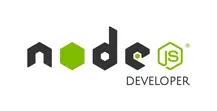NodeJS is an open-source, multi-platform Javascript runtime environment that enables server-side Javascript execution. Javascript code may now operate outside of a browser thanks to Node.js. This is the era of JavaScript, and it will only get more optimized, especially with the widespread adoption of HTML5 and the amazing features of NodeJS.
Web development is the primary usage of Node.js, which has a large number of modules. Therefore, the position of Node.js developer is in high demand for the workforce and many employers are actively recruiting for this position with attractive salaries and benefits to find candidates with Node.js ability and experience.
Understanding NodeJS will help JavaScript developers use JavaScript to develop data-oriented, fast, and scalable real-time web applications. It also helps them quickly adapt to any emerging modern JavaScript technology.
A NodeJS Developer is responsible for writing web application logic on the server side using JavaScript. They are often responsible for developing back-end components, connecting the application to other web services (typically third-party), and supporting front-end developers by integrating their work with the NodeJS application.
Their main focus will be to ensure high performance and the ability to meet requirements from the front end.

Currently, Node.js developers will perform the following tasks to meet the different requirements of each company:
Node.js developers will directly participate in the process of building websites, software, and applications for customers, and businesses. Specifically:
Managing the data exchange flow between the server and users;
Developing backend components to process data, and connect to databases;
Linking features on websites, and applications together through the backend;
Processing requests and queries from users;
Testing and maintaining products to ensure quality and performance.
Describing and overviewing the characteristics of the product or project to be developed;
Analyzing the requirements and functions of the product/project based on customer and business needs;
Researching factors affecting user experience to suggest appropriate interface and feature design;
Forecasting potential issues and proposing suitable solutions for the project.
Proposing supporting solutions for product/project development processes.
Researching and developing products to provide the best user experiences.
Updating new knowledge of technologies and techniques to continuously maintain and improve the quality of websites, software, and applications.
Ensuring the system always operates stably and better meets user needs over time
Preparing reports or other works as required by the project.
Implementing security and data protection measures during product development.
Integrating storage and database management solutions to ensure an effective and logical storage system.
Taking responsibility to ensure product quality through testing, and bug fixing before handover.
Supporting resolution of technical issues arising during the operation and use of the product
Having a solid foundation of JavaScript will be a prerequisite to becoming a skilled NodeJS Developer. Here is a list of essential skills that will certainly help you become an expert in NodeJS:
Basic knowledge of front-end technologies like HTML5 and CSS3
Knowledge of NodeJS and other frameworks like Express, StrongLoop, etc.
Understanding asynchronous programming and how it is solved.
In-depth understanding of server-side templating languages like Jade, EJS, etc.
Good knowledge of server-side CSS preprocessing tools like Stylus.
Experience working with user authentication and authorization across multiple systems, servers, and environments.
Ability to integrate multiple data sources and databases into a system.
Understanding basic design principles behind a scalable application.
Knowing the differences between distribution platforms and optimizing their outputs.
Implementation of automated testing and unit testing platforms.
Expertise in code versioning tools like Git.
Hands-on experience working on NodeJS development tools like npm, grunt, gulp, brunch, broccoli, etc.
Error handling is an important part of getting an application right: knowing when to encounter issues, or just logging errors and continuing/retrying may be tricky.
Twelve-Factor App manifesto describes best practices for how to build web applications.
Solid knowledge of Semantic Versioning.
Additional skills related to NodeJS like AngularJS, PHP, jQuery, CSS3, etc.
The demand for NodeJS Developers is growing rapidly, so this is a good time to upgrade skills with the latest NodeJS skills.
Although it has been recognized as a leading solution for many projects, Node.js can still be considered a relatively new technology. Therefore, many NodeJS Developers have some prior experience with other languages.
It is no surprise that more experienced NodeJS Developers have higher salary expectations. However, most professional NodeJS Developers have between 3 to 9 years of experience in the field.
According to PayScale, the average salary range for NodeJS Developers in the US is $48,000 to $130,000, with an average of $86,948 (at the time of writing this article). At the same time, the average hourly rate is $26.75.
